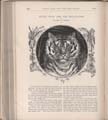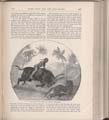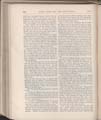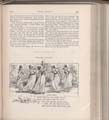
stnic.188304.001.001.jpg
TSANG TSAN AND THE MAN-EATER
"Now, my son," said Tsang Tsan's father, one morning, "be sure you take the path across the fields. It 's the longest way, but it 's the safest."
"Yes, sir," replied Tsang, dutifully.
"And try not to fall asleep on the way," added his eldest brother, gravely; "for the cows would be sure then to go by the grove, because that is the way they usually go."
"I 'll keep awake," said Tsang, a little impatiently, but respectfully, too, for in China the eldest brother is held next to the parents in consideration.
Tsang was then lifted up and placed astride of one of the cows, which at once started off at a leisurely pace, followed by its fellows in straggling but solemn order. There was a short struggle at the path which turned toward the distant grove, but after a few sharp blows with his switch, and a few vigorous pulls at the thong fastened in the nose-ring, Tsang came off victorious and made his cow take the new path. The other cows, after a few moments of surprised indecision, followed the one which Tsang was riding.
Little Tsang's cows were not the comely, mild-eyed creatures we see in our
country; they were water-buffalo cows, with very large bodies, small, fierce,
red eyes, long, semi-circular flat horns, and almost hairless, dirty-gray
colored hides. Each had a ring in its nose and a tough thong was tied to the
ring and wound about the horns of all but the cow ridden by Tsang. But for the
nose-ring

stnic.188304.001.002.jpgand thong the buffaloes would have been
unmanageable, for they are as different in temper as in looks from our gentle
cows.
A very odd picture Tsang made as he sat astride of the buffalo, for its back was so broad that the little boy's legs were almost at right angles with his body. But he could readily change his position and sit with both feet on one side. It required no great skill to ride the broad-backed, slow-moving creature, and Tsang was so accustomed to it that he gave no more thought to himself than if he had been in a chair. And practice had made him expert at riding the buffaloes.
So secure was he, in fact, that he acted more as if he were on the ground than on buffalo-back, and[illustration - "Poor Tsang! He could only scream."] the elder brother's warning was not at all unnecessary, for it was no unusual thing for Tsang to compensate himself for rising at daybreak by half-reclining upon the buffalo's back and taking little naps, as often as the animal stood still.
This morning, however, he took measures to drive away drowsiness, as he had no desire to be carried through the grove where a most unwelcome visitor was supposed to be lurking. It was very seldom that tigers were seen in that portion of China, but occasionally they had been seen, and now, for the first time in Tsang's short life, one had come into the neighborhood.
For two weeks it had spread terror through the surrounding country, not merely by giving occasional glimpses of its great striped body, but by carrying off two children and a man; for, unfortunately, it was a man-eater, and would have no other food when the human kind was available. All of the terrible creature's depredations had been in or near the grove, and, therefore, for more than a week that vicinity had been deserted by those who lived there, and avoided by those who did not.
It was not strange then that Tsang's father wished him to go by the longer but
safer road. He

stnic.188304.001.003.jpg would even have kept Tsang at home if
he had been able to afford it; but he was not, and he needed all the money that
could be earned by his buffaloes in the work at farmer Yu's rice-fields, where
they helped in the plowing and irrigating. Tsang, himself, was not particularly
afraid of the tiger. This was not because Tsang was brave, but because he was a
boy. He had not yet seen the tiger, nor had any of his friends, and consequently
it was not very real to him; and, unless it was real, how could he be afraid of
it?
During the two hours' ride to farmer Yu's, Tsang amused himself by practicing on a rude bamboo flute, trying to catch some of the airs most familiar to him, and succeeding so poorly that it was well he had no other hearers than the dull buffaloes. It was a wonder that even they bore it as patiently as they did, though Tsang was fully convinced that he was making exceedingly sweet music.
Tsang stayed all day at Farmer Yu's; and while the buffaloes were plodding wearily around the short circle, pumping water from the canal into the rice-fields so as to cover the seeds with water, the farm-hands talked of nothing but the tiger,—how monstrous and how fierce he was, and how a whole company of soldiers had been ordered to come and kill him.
One of the hands told how he had been near when the man was seized and carried off by the tiger, as a cat might carry off a mouse. He said the tiger was as big as six dogs, was covered with black and white stripes, and had a mouth so big that it could hold—well, it could take in Tsang's head. Whereupon little Tsang shuddered from head to foot, and uneasily wished the man had thought of some other way of describing the terrible mouth.
But the man, who saw what an effect he had produced, went on adding to Tsang's discomfort by telling of the tiger's long, white teeth and terrible roar, until Tsang began to look forward with dread to the approach of night, when he would be obliged to go home again.
"He never leaves the grove, does he?" faltered Tsang.
"At first he did n't," said the man who had been describing the tiger; "but since everybody has kept away from the grove for so long, he must have become very hungry, and there 's no knowing where he may be now."
"Nonsense!" exclaimed Farmer Yu, sharply, for he saw how frightened Tsang was. "The tiger wont leave the grove; so have no fear, my boy."
But Tsang did have fear, and tried to find somebody who lived in the direction of his home, when, after the evening meal, he gathered his buffaloes together. Nobody was going his way, however, and it was with very different feelings from those he had had in the morning that he mounted his slow-moving animal and started for home, by the road over which he had come.
There was very little probability that he would fall asleep now, for his mind was full of visions of gaping mouths, bristling with gleaming white teeth; and, do what he would, he could not help comparing the opening between the dreadful jaws with the size of his head. And behind every clump of bushes he fancied he saw black and white stripes.
The further he got from Farmer Yu's, the more real his fancies seemed to him, until, at last, he was in such a tremor of fear that every note he blew on his flute was a tremolo; for, as American boys keep up their courage in lonely places at dusk by whistling, so Tsang was trying to cheer himself by playing on his flute. A final wailing, quavering note so worked upon his nerves, however, that with a sob and a shudder he thrust the unlucky instrument into his belt and clambered to his feet on the buffalo's back, the better to look about him; as if he expected to find that the wail from his flute had, in reality, come from the tiger, concealed not far away.
He could see nothing, however, and, after a few moments, resumed his sitting posture. Never before had Tsang examined the landscape so carefully, or been so anxious to reach home. He whipped and worried his buffalo to make it move more quickly; but the tired animal not only refused to quicken its movements, but Tsang thought it even went more slowly. Certainly, it resented his goading, for it snorted savagely, and its little red eyes glowed redder still.
Tsang, however, cared nothing for its anger, nor for the fact that all the other cows seemed to sympathize with it. He only thought of the tiger, and its mouth, and teeth, and stripes, and he raised his whip to strike again, when his eye was caught by a slight waving in a clump of tall grass, a short distance ahead of him.
Here was something real, at last. Tsang stared wildly at the spot, and held his breath from fear. In his imagination he was already half devoured. A half-choked scream broke from his lips, and he frantically pulled at the thong to turn his buffalo around. But the buffalo, too, had seen the waxing grass, for she tossed her head with a half snort, half bellow, and stood pawing the earth, totally disregarding Tsang's efforts to turn her. The other cows followed her example, and all had their eyes fixed on the clump of grass.
Poor Tsang! He had nothing but voice left now,—all his strength was
gone,—and he could only scream. That, however, he did, and right lustily
too, until the grass waved suddenly with

stnic.188304.001.004.jpgmore violence
and out from it shot the very striped creature of Tsang's imagination. That
spectacle froze Tsang's voice, and left him with open mouth and staring
eyes.
Then there was a sudden rush, a cloud of dust, and a horrible mingling of hoarse bellows and loud, cat-like yells.
Where was Tsang? He did not know; he was not on the buffalo—he was somewhere— he was waiting. His eyes were shut tight, but his ears were open and rang with the terrible sounds that filled the air. He thought that he felt the hot breath of the tiger on his face—and then consciousness left him.
A little later, a small boy sat in the dust, staring about him; a half dozen buffaloes were grazing in the ditch, and a great bulk of yellow and black stripes lay not far away.
The small boy was Tsang. He was not a bitdead; he was not hurt, nor even scratched; and, in fact, nothing at all was wrong with him. The buffaloes were his, and the huge yellow and black object was his—if he wanted it. It was what was left of the tiger, which, in looking for one thing, had found another. Instead of small boy it had found buffalo, and the buffalo had treated the tiger as the tiger had intended to treat the small boy—had killed it.
Tsang was very much astonished to find himself alive. How it had all happened, he did not know. He could not comprehend that his excited imagination had made him feel the breath of the tiger, and therefore he was firmly convinced that he had been in the very clutch of that creature.
That was the story he told at home, and that was what they all believed. What was left of the tiger-skin was saved, and the possession of it made Tsang a hero for the rest of his life.